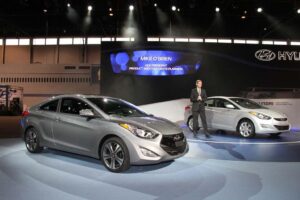Likely to worsen maker’s inventory shortage.
by Paul A. Eisenstein on Aug.08, 2012

With models like the Elantra already in short supply, the strikes could cause serious problems for Hyundai.
The walkout won’t shut Hyundai down entirely, employees planning to halt work for several hours at a time between now and August 17th – while also refusing all overtime — in a bid to pressure the Korean carmaker to increase wages and reduce its traditionally long workday.
Even with its factories working on an abbreviated schedule the situation poses a serious dilemma for Hyundai, now the world’s fifth-largest automotive manufacturer. With demand surging in markets around the world it has been struggling to meet demand and expects to lose market share because of inventory shortages in the U.S. this year.
Strikes last month were the first in three years and marked a reversal for labor/management relations that had steadily improved for more than a decade. Korea has traditionally been home to some of the world’s most militant labor organizations and in decades past walkouts were more the norm than the exception around the time of contract bargaining.
The July walkout cost the maker more than 14,000 units of lost production – worth about $239 million, according to Hyundai.
It’s unclear how much of an impact the latest round of strikes will cost. The confrontation formally began on Wednesday when workers walked off the job for two hours.
An early vote by members of the 45,000 member union found 70% in favor of striking – a signal that the union expects to give the company a hard fight in a bid to increase wages and curb what it bills as excessive overtime on top of an already long work week.
The battle likely couldn’t come at a worse time for the maker. Hyundai was one of the only auto companies to gain ground in Europe so far this year – in part due to a new free trade agreement with the European Union. It has also posted a string of ongoing sales records in the United States, where it was shooting to reach the 700,000 sales mark.
But despite year-over-year sales gains, Hyundai Motor America is not keeping up with the overall market upturn and CEO John Krafcik has recently warned market share will almost certainly slip for all of 2012. An escalation of the current labor situation could short-circuit the bid to set another sales record, as well, according to observers.
Hyundai has been struggling to deliver more products out of its U.S. plant and has been looking at ways to either expand that facility or possibly even add a second plant. The potential for increased production costs in Korea – as well as a return to more confrontational labor relations – could influence that decision, according to one senior company insider.
Meanwhile, workers at Hyundai’s second brand, Kia, will join the production disruption on Friday.


No comments:
Post a Comment